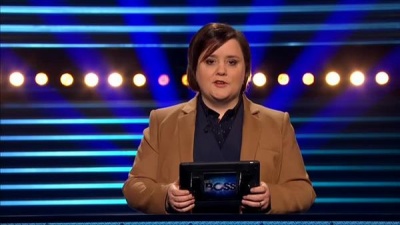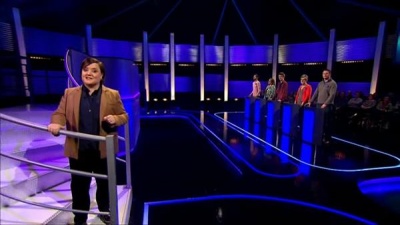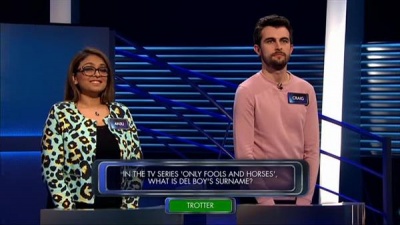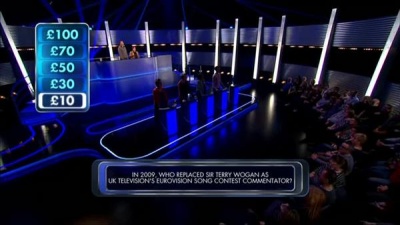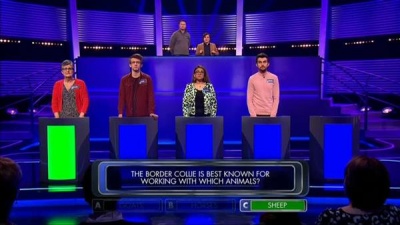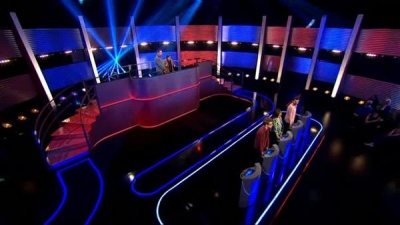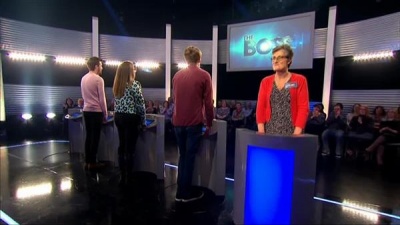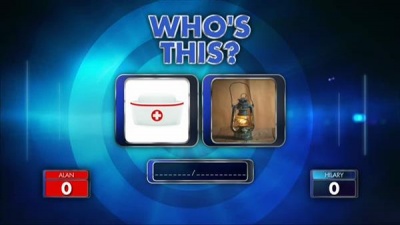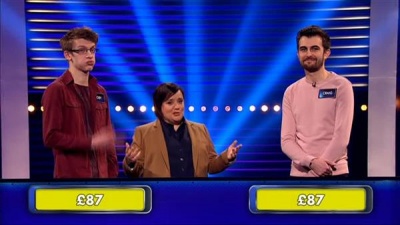Weaver's Week 2017-05-07
Last week | Weaver's Week Index | Next week
The Boss
BBC Studios for BBC1, from 24 April
Always exciting to see the first production from a new independent company. "BBC Studios" used to be the BBC's internal production arm, it's now been spun off into a discrete business fn1. It could be no worse than Salford's debut show, Don't Scare the Hare.
The Boss is a daytime quiz show. Good. Daytime quiz shows keep this column ticking over, they come along with surprising regularity and tend to be better than the professional critics think. The best daytime shows are self-contained little dramas, a struggle for supremacy where success ebbs and flows. Luck can help, skill is essential.
Susan Calman hosts. Even better. It's easy to overlook Susan Calman's talent, and how she brings an infectious wry wit to every single programme.
At the start of the show, Susan stands on a platform overlooking the rest of the studio. Beneath her are five contestants, introduced with name / location / occupation. It's no more and no less than contenders get on Fifteen-to-One.
The players are on plinths, and they spin round to face away from Susan. Some of the players might not see the host again for 40 minutes.
To begin the show, Susan asks questions on the buzzer for 90 seconds. These questions – and the model answers – are shown on screen. That's standard for multiple choice questions, but rare for straight buzzer questions. One point for each right answer, a point off for an incorrect answer. If there's a tie, they ask further questions to those players until there's a winner.
Someone has won the round. They get to choose the first Boss, a player with great power and great responsibility. The round's winner can nominate themself, or one of their rivals. As we'll see, the Boss is exposed and vulnerable.
Whoever is named the Boss climbs the stairs and joins Susan in the raised platform. We now find it's the "Boss's office", though we don't see any decorations. Where's the cat pictures, who moved the Newton's cradle, wither the fidget spinners?
A graphic appears saying "Boss's Questions". The Boss will answer five questions to set the value in the round. In the first round, possible values are £10 – £30 – £50 – £70 – £100. A right answer moves up the chain, a wrong answer moves down the chain.
It's difficult to reach the top – a Boss would need to get every question right except for the first. And it's almost impossible to finish in the middle – the Boss needs to get the first question wrong, the second right, and precisely two of the remaining three right.
Realistically? The round is for £10, £30, or £70 per question.
Then another graphic appears, "Team Questions". It introduces a round of questions for the team. Susan reads the question, and three options. The players on the floor key in their answers. The Boss on the gantry calls one of the players, who reads out the answer they selected. If this is right, the team wins the value set by the Boss's questions earlier.
Two minutes of this – any question not answered from the floor in time is lost. Susan can gabble a bit in an effort to get one more question in.
And then some statistics. "You went most to Barney, but Gemma gave the most answers. If you'd had a perfect round, you could have banked £770. As it is, you only added £350. Matt was the strongest link, but will the votes..?"
No! Just because this show feels like The Weakest Link, it's not. Susan has a catchphrase of her own: "if you dare to defy, challenge now".
For five seconds, the lights around the studio bounce. The audience whoop and cheer, and the music reaches maximum tension. The players can press a button on their console to signal their wish to usurp the Boss. This is the Leadership Challenge segment.
Susan milks the situation for a little while – ramping up the tension, but never going over the top. Eventually, she will ask who challenged, and the challenger's podium will swivel.
One challenger is simple: boss versus challenger. More than one challenger? The Boss picks an opponent from the challengers. No challengers? The Boss picks two players to fight out in the subsequent match. Whoever's playing will ascend to the "Boss's office".
The elimination match is best-of-three on some simple puzzles. Rebuses, one-letter-shift codes, a person linking two pictures, wordsearches, that sort of thing. Visual puzzles, where the whole challenge is on screen – but that means we don't see the player and puzzle at the same time.
After this short interlude, the loser steps down and off the show. Rounds two and three have the same structure, the only change is larger cash pots. £10 – £30 – £50 – £100 – £200 in round two, £10 – £50 – £100 – £150 – £300 in round three.
By the final, there are two contenders, and one prize fund. It can be a few hundred quid, can be a few grand, usually seems to come out around £1000. The prize is split into five equal chunks, and each chunk's associated with a category. The Boss calls which order the categories are played.
In each category, there's a visual puzzle requiring two answers. One player buzzes in to provide one answer, the other player gives the other answer. Get either answer wrong, or pass, and the money in that category is lost. 90 seconds to give all the answers – a generous time limit in practice, players tend to have half the time for the last question.
The cash is split equally between the two players – anything from £1000 each to £87. But they can challenge to scoop the lot – one final puzzle would decide who wins the prize. It's a sort of prisoners' dilemma, but without the zero-pay possibility. We don't much want to spend 45 minutes on a show just for both players to leave with nothing. And if they must all lose, let it be because they're rubbish and blew all five questions in the final.
Susan Calman is by far the best thing about this programme. She's been told to include some office-based jokes in her patter, some of them work. She's sassy, witty, and knows when to shut up and let the game happen. When the final pair have thousands at stake, she's respectful; when they're squabbling over £87, she brings out the slight absurdity.
On a theoretical level, we appreciate the show's pace like we appreciate a classical symphony. A short overture. Then three movements – the structure is the same, the emotional outcomes can be very different. It all builds into one final climax. Never hurried, never slowed down, The Boss works at the right tempo.
But the rest of the show left us nonplussed. Lots of questions, some power dynamics. This column tried to write a review using a Game of Thrones metaphor, but the show didn't support it. The presentation is more over-the-top than is fashionable at the moment, at times it felt like a flashback to 2002.
Overall? The Boss is a good effort. The structure and pacing are promising, but the presentation doesn't quite gel.
{1} There is a company with a similar name, BBC Studioworks, but it does something different. BBC Studios' works are not to be confused with BBC Studioworks' works, as BBC Studioworks works in studios, and BBC Studios works in a studio. BBC Studioworks manages the spaces that are studios, so that BBC Studios can make studio works in a studio.
There is one slight complication: "BBC Studios at Television Centre" is the collective name for studios operated by BBC Studioworks for companies including BBC Studios. So, by the end of the year, we will have a BBC Studios Production made at BBC Studioworks' BBC Studios. Hope that's clear. Back to main article
This Week and Next
The pictures describe Florence Nightingale.
We continue with Radio 4's Brain programme, now in the third semi-final.
A very high-scoring opening – John Benyon got four. Roman Dubowski answered six in a row – a bonus, and five of his own for another bonus mark. These two pulled away in the next couple of rounds, and John Benyon after the Beat The Brains interlude.
Not much scoring in the final round, leading to this final score: Dave Cowan 6, Tony Walmsley 6, Roman Dubowski 11, John Beynon 13.
With strong play from all competitors, there was only time for five rounds, and the final contender did not receive a music question. Russell Davies mentioned the curious story of Lobby Lud – we covered that some years ago.
Across the pond, the daytime Emmy awards were given out. Jeopardy won for Best Game Show. Steve Harvey took the award for Best Game Show Host.
BARB ratings in the week to 23 April.
- Broadchurch (ITV, Mon) the top show of all, with 11.2m viewers. Got Talent (ITV, Sat) the top game, 10.55m.
- Have I Got News for You returned (BBC1, Fri) to 5.35m. Masterchef (BBC1, Thu) had 5.2m.
- ITV's weekend schedule boasted Bigheads (Sun) and Take Me Out (Sat), both 3.1m. Bake Off Crème de la Crème topped BBC2 (Tue, 2.4m).
- ITV2 holds all the trumps on digital: Britain's Got More Talent (Sat) 1.06m, Celebrity Juice (Thu) 890,000, Hell's Kitchen (Tue) 480,000.
- Good scores for Would I Lie to You (Dave, Wed, 330,000) and Gladiators (Challenge+1, Sat, 55,000). Fib-spotting quiz Celwydd Noeth (S4C, Thu) has 33,000 viewers. Artsworld spent Easter Monday reliving Portrait Artist of the Year 2014, to a peak of 35,000.
The Eurovision Song Contest is here! Semi-finals (Tue & Thu: BBC4, RTE2, also RTE Radio 1 on Thu; Sat: BBC1, Radio 2, RTE1, and RTE Radio 1) and BBC promotion (Red Button from Tue).
Finals of Tattoo Artist of the Year (E4, Tue), Hell's Kitchen (ITV2, Tue), Battlebots (Spike, Wed), and Masterchef (BBC1, Fri).
Photo credits: BBC Studios.
To have Weaver's Week emailed to you on publication day, receive our exclusive TV roundup of the game shows in the week ahead, and chat to other ukgameshows.com readers, sign up to our Yahoo! Group.


